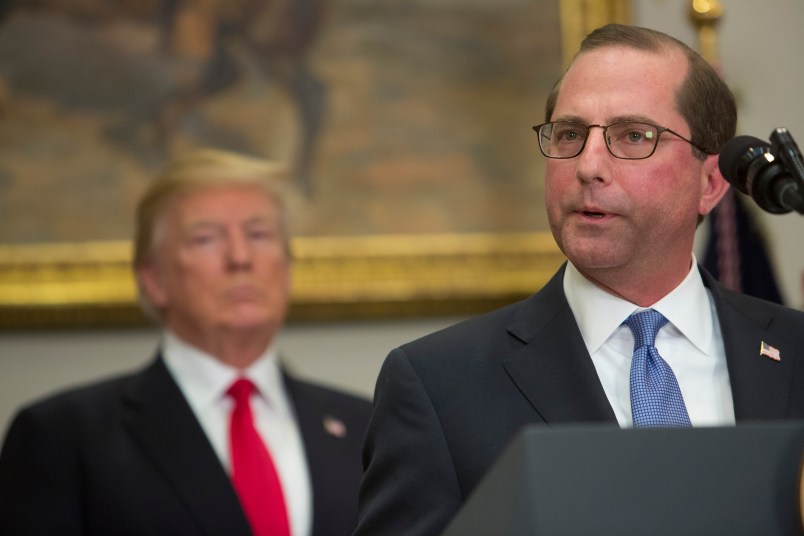Newly-sworn-in Health and Human Services Secretary Alex Azar flew to Indiana on Friday to announce that the state has been approved to impose work requirements, premiums and a 90-day lockout provision on its Medicaid population.
The green light for the state — home to Vice President Mike Pence and Centers for Medicare and Medicaid Services Administrator Seema Verma — to impose those restrictions is the second ever allowed in Medicaid’s 50-plus year history, and follows on the heels of a similar waiver for Kentucky that is already drawing legal challenges.
Once fully phased in, the Medicaid waiver — titled the Healthy Indiana Plan, or HIP for short — will allow the state to kick out enrollees who can’t prove they are working, studying, volunteering or applying for work at least 20 hours per week. People older than 60, pregnant women, primary caregivers and those deemed “medically frail,” among others, will be exempt.
“There is a robust body of academic evidence to show that work is a key component of well-being,” Azar said Friday in Indianapolis when he announced the waiver. As TPM has previously reported, however, the academic study HHS cited to argue that work requirements will make people healthier was conducted in England, where all citizens have access to universal health care whether or not they are employed.
Additionally, under the new waiver, Indiana Medicaid enrollees who fail to renew their coverage in time will be locked out of Medicaid for 90 days, a provision that could lead to tens of thousands of people losing their health insurance.
The waiver also extends Indiana’s policy of charging its low-income enrollees premiums of between $1 and $27 per month and locking them out of coverage for six months if they cannot comply. Since the policy went into effect in 2015, more than 25,000 enrollees have been dropped from the program after failing to make the payments, and only half of them subsequently found another source of health coverage. An addition 46,000 enrollees were blocked from coverage because they failed to pay their first premium.
Though the vast majority of Medicaid enrollees are already working or unable to do so, imposing the work requirement has been a priority for President Donald Trump’s administration — though many legal experts and health care advocates say the policy violates the purpose of Medicaid, and are taking states to court on behalf of low-income enrollees at risk of losing their coverage.







Hear that, Congresspeople?
Here’s How Much Less Congress Works Than You Do
Can we impose work requirements on beneficiaries of the GOP Tax Scam? Especially for inherited wealth?
Well, Mr. Azar, the Magic Eight Ball sez, “I see a long, drawn out court case in your future.”
Somewhere, Charles Dickens is chuckling quietly to himself. “Are there no workhouses? Is the treadmill not still in operation??” It’s amazing how quickly the Rethuglicans want to bring back the good old days of the 19th century. Vote 'em all out next November!
Huh. In 2015, one of the largest outbreaks of HIV in a rural area was in the State of Indiana. Pence was then Governor. His first response to the outbreak? Prayer. But, for some reason, that didn’t work. Then, he eventually backed a plan of needle exchanges. Grudgingly.
I wonder if those people are going to have to be put to work.